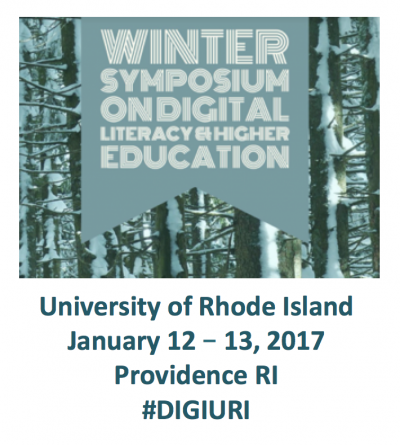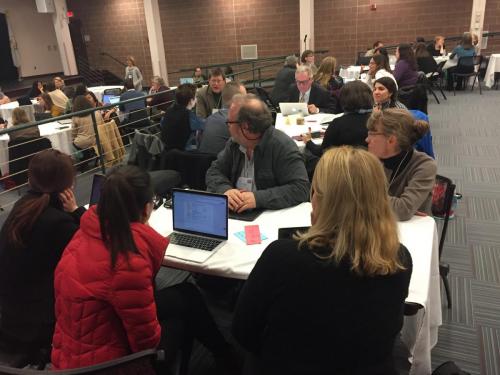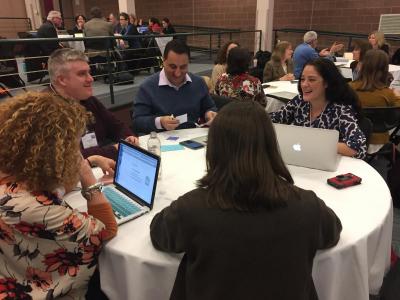On January 12 - 13, more than 50 college professors participated in an invitation-only symposium on digital literacy and higher education in Providence, in an event co-sponsored by the Media Education Lab, the URI School of Education and Professional Studies, and the State of Rhode Island Office of the Postsecondary Commissionere
 Professors have been struggling to meet the needs of a new generation of students, who swipe, click and tap their way through social media and are increasingly likely to get their news from Facebook and Twitter. But college professors are learners, too. Educators struggle with how to best support students’ learning needs in a digital age. “At the present time, we do not yet have a good sense of 'what works' to address faculty needs regarding the use of digital media texts, tools and technologies for teaching and learning activities, career advancement, and scholarly research communication, collaboration and publishing,” said Renee Hobbs, URI communications professor and co-director of the symposium.
Professors have been struggling to meet the needs of a new generation of students, who swipe, click and tap their way through social media and are increasingly likely to get their news from Facebook and Twitter. But college professors are learners, too. Educators struggle with how to best support students’ learning needs in a digital age. “At the present time, we do not yet have a good sense of 'what works' to address faculty needs regarding the use of digital media texts, tools and technologies for teaching and learning activities, career advancement, and scholarly research communication, collaboration and publishing,” said Renee Hobbs, URI communications professor and co-director of the symposium.
The Winter Symposium on Digital Literacy in Higher Education is an invitational event that brings together experts from 14 states and 2 countries (including 30 faculty from eight Rhode Island institutions of higher education) to explore the future of digital literacy in higher education. The program builds upon the success of the URI Summer Institute in Digital Literacy, now in its 5th year, which offers educators an intensive weeklong learning experience in advancing the competencies required for full participation in our increasingly digital world.
The symposium focuses on digital literacy in the context of the disciplines of writing and rhetoric, media and communication, design and the arts, the humanities and social sciences, and teacher education. Participating faculty discuss these topics and questions:
The Digital Literacy Competencies of Faculty, Undergraduate and Graduate Students. Today, teachers and learners need knowledge, skills and attitudes that help them fully benefit from the variety of digital texts, tools and technologies available for learning and teaching. What are the fundamental digital literacy competencies that we expect every college faculty and every student to posses?
Teaching and Learning With and About Digital Media. Digital media and technology enable new ways of learning. Many educators are experimenting with social media tools that make it possible to create seminar-like experiences through video conferencing. What are some emerging “best practices” for the educational use of social media in higher education?
The Digital Identity of the College Professor. Some faculty are highly visible online and their scholarly and professional work can be easily accessed using a simple Google search. Others are invisible online with barely a reference to an email or phone number available through an online search. How do faculty navigate the increasingly blurred boundaries between personal and professional identities online?
Scholarly Networking and Digital Literacy. Faculty, scholars and researchers are connecting, communicating, collaborating and learning with one another through social media platforms--blogs, websites, social bookmarking sites and twitter among others. Building a personal learning network is increasingly shaping how we present ourselves and extend our scholarship. What does it mean to be a networked learner and how do faculty model this in their courses and research activities?
 In partnership with Virtually Connecting, a global coalition of academics who use digital media for professional networking, some sessions of the winter symposium will be open to the public through the use of Google Hangouts. Twitter users can follow the symposium dialogue using the hashtag #digiURI.
In partnership with Virtually Connecting, a global coalition of academics who use digital media for professional networking, some sessions of the winter symposium will be open to the public through the use of Google Hangouts. Twitter users can follow the symposium dialogue using the hashtag #digiURI.
The symposium begins at 4 p.m. on Thursday, January 12 and continues on Friday from 8:30 - 4 p.m. On Friday morning at 9 am, Professor T. Mills Kelly, a historian at George Mason University and author of the book, Teaching History in the Digital Age offers the keynote address. He is a noted national expert at the intersection of historical pedagogy and digital humanities. Distinguished experts participating in the program include Professor Joyce Valenza of Rutgers University, a leading expert on digital media and technology in school libraries.
Program co-directors include Renee Hobbs and Julie Coiro of the University of Rhode Island, Sandra Marcus, a professor at the Fashion Institute of Technology in New York City, and Maria Ranieri, a professor at the University of Firenze in Florence, Italy.
The program is co-sponsored by the Media Education Lab, the URI College of Education and Professional Studies, and the State of Rhode Island’s Office of the Postsecondary Commissioner, led by Jim Purcell.
